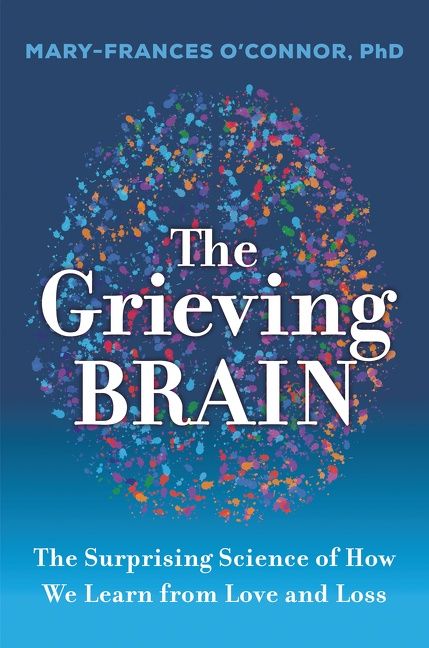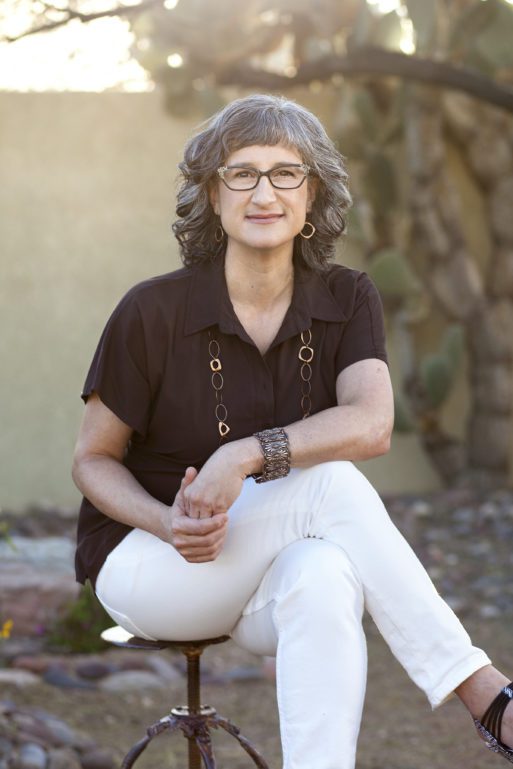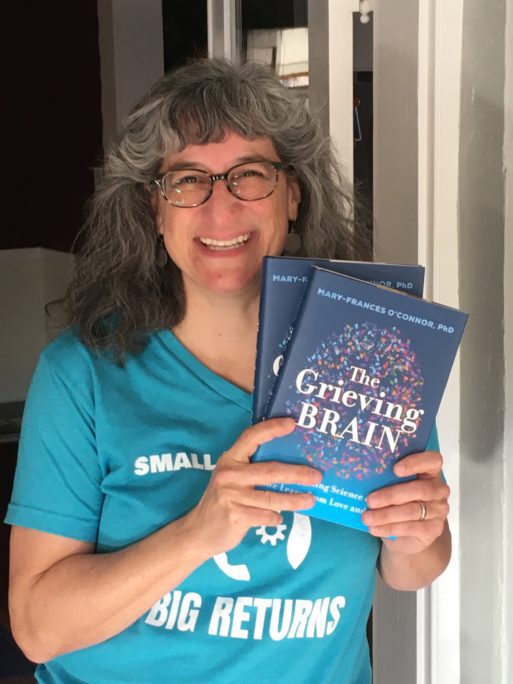
The Grieving Brain, published by Harper One in February 2022
Mary-Frances O’Connor has studied the brain for over 20 years, and is an associate professor of clinical psychology and psychiatry at the University of Arizona and the director of clinical training. Her new book, “The Grieving Brain,” was released earlier this year; however, her journey to understand grief began much earlier.
When Dr. O’Connor was in the eighth grade, her mother was diagnosed with an aggressive malignant cancer. Though the prognosis was bleak, her mother ended up living another 13 years, but died when O’Connor was 26 years old. Though those 13 years could have been seen solely as a gift, they were more like grief-soaked, uncertain times for the O’Connor family. Dr. O’Connor’s research into the grieving brain is more than just wondering about how she and her sister were impacted by the death of their mother. It’s about the anticipatory grief her mother experienced over a decade leading up to that painful moment.
In the introduction for “The Grieving Brain,” you bring up the difference between grief and grieving. Could you explain the separation of those two experiences?
I think this has proven very helpful to people. Grief is this wave that hits you, a momentary feeling. But grieving is the way that grief changes over time without ever going away. What people are finding most helpful is the idea that we can experience grief any time we become aware of this really important loss. That could be six months, six years, six decades after we lose someone. Feeling grief is normal and natural, but the intensity and frequency, even the familiarity of grief — those things all change over time as we restore a meaningful life for ourselves.
You share a story early on in the book about a woman who believed she was crazy because she thought she had seen her recently deceased father. You also talk about people who actually have a desire to search for their lost loved one. Could you share more about this phenomena of seeing people who have died and even searching for them?
It’s reassuring for a lot of people to know both of these reactions to the death of a loved one are very common. I was just talking to another young woman yesterday, who said, “I feel like I see my dad everywhere.” It makes sense. Our brain is a prediction machine. It’s expecting to see them. We have motivation to seek out our loved one. Those brain experiences don’t immediately end when a person dies. Our brain takes a long time to update. If it’s expecting to see someone, it’s easier to see them. If you have a yearning for them, it doesn’t make sense that they’re gone. The brain doesn’t understand “gone”; it understands “far away and must go get.”
Everyone’s brain works at a different pace when it comes to updating. We all learn at a different pace anyway, but also, every relationship is different. If someone you lived with has died, every single habit — brushing your teeth, cooking, opening the curtains in the morning — all of those things once incorporated that person. So your brain might take even longer to update after they’re gone. On the other hand, if they were already far away, like if you don’t live close to your parents, it can be hard to remember that they’re gone. Their loss doesn’t have a daily impact on your environment, so your brain might forget.
Could you explain the notions of being in the present and remembering the past versus trying to live in the past with time standing still?
The most common question I get from people who are grieving is, “Is this normal?” Whatever they’re feeling, they want to know if others have felt the same. Grieving people may want to share memories of lost family members or friends, but they may decide not to share, thinking it may be too depressing. But, of course they want to talk about them. There’s a difference between doing that, sharing memories of the person who died in the here and now, being cognizant that you’re reflecting on the past, and reveries where you try to imagine the deceased is still there and everything is still the way it once was. It’s almost like a fantasy — that is less helpful in the long run.

Credit: Bevin Christina
You bring up the term psychological distance, which as a writer, I’m very interested in. In creative writing, we talk a lot about psychic distance in two ways. One, when you’re writing creative nonfiction, some writers use the second person, the “you,” to talk about traumatic events they’ve experienced so that they feel brave enough to share. We also talk about it in fiction, having the narrator have psychic distance from an event to shield the audience or if there’s barely any psychic distance how it may expose the audience to something. How is this related to the grieving process?
It’s still sort of the closeness between two people — in the case of writing, it can be the author and the audience and reader. In this case, it’s the distance between the bereaved person and the person who died. The reason I believe thinking of it in this way gives us a new way to think about the emotions we have when we grieve, is that for a while — just like it can be hard to understand where they are — it can be hard to figure out why you can’t feel them, why they don’t feel close. It doesn’t really make sense that they’ve died. The only alternative your brain can comprehend is that they’ve gone away, they’ve left you. Many of the emotions we have, wanting to have closure, say goodbye, or ask forgiveness occur partly because we’re still maintaining that virtual relationship for a long time. But then we have other feelings — being angry with the person who died, for example, because you can rationally know they’ve died and still feel like they’ve left you. Perhaps they’re still out there somewhere, and if you’re angry enough they’ll feel bad and come back.
What impact does time have on both grief and grieving?
Both may lessen over time. Grief can be less frequent and often less intense, so even though it may happen over time, it’s more familiar. Grieving never really ends because your understanding of what this loss means for your life changes as your life goes on. My sister is engaged to be married, and I know that on her wedding day, we’re going to have grief that our mother isn’t there. We’ll talk about what she would’ve liked about the wedding, what she wouldn’t have liked about it, and all of those things because she is still an absence that my sister and I carry. That doesn’t go away. I don’t think about my mother every day, but I will be reminded of her at moments when her loss is really important.
Some people ask, “When will this be over?” I then respond to them, “When did you get over your wedding day?” Neither question makes sense. The person’s death is an event. The relationship gets transformed and is true forever. There are all sorts of implications.
Can you talk to me about the fMRI of the brain for your studies?
A fMRI tells us what part of the brain electrical activity is happening in. The advantage here is that the brain does have a bunch of specialized areas, so understanding how people are creating these feelings is really interesting. I wanted to know if different brains do that differently. I wanted to know if people who are not adapting well to loss had something about their brain function that was prohibiting them. I wanted to know if there was something constraining their ability to grieve or for that grief to change.
During the very first study of looking in the black box of the brain, we asked participants to bring in photos of their lost loved one. While lying in the neural imaging scanner, we showed those photos to them to see which parts of the brain showed the firing, or activated neurons. We learned that grief is a very complex thing for the brain to produce due to the areas of the brain lighting up during the study.

Dr. O’Connor holding her book, The Grieving Brain.
Credit: Richard Grossman
At the end of your book, you share with readers that people can’t learn from advice. Honestly, your book was so fascinating, I didn’t realize that you hadn’t dished out any advice throughout the entire work. Could you explain why?
It’s been my experience because of my own life that insight comes from the inside. Just because you hear something doesn’t mean it’s true for you. You have to incorporate it into the way you understand something. Often new insights come because you’ve heard different things, but they come from the inside. Grieving people get a lot of advice. It’s very often not relevant and doesn’t fit with their experience and often makes them feel even more alienated.
Would you agree then that the bulk of your book is simply to present experiences that grieving people have to show that it’s all a normal part of the process?
Yes, but also, I want to share why we go through all of these emotions. It isn’t that you should change how you feel, but understand why you feel that way. I get a lot of emails from bereaved people who share that they never understood why they were feeling a specific emotion — they felt wrong or crazy or whatever. After learning about how much work the brain has to go through to process the loss of someone, they can come away understanding that of course they feel that way. It’s normal. It’s human. It makes their feelings less problematic; they’re not thinking about their feelings anymore or trying to figure them out. There are lots of coping strategies to help grieving people get back into the present moment and decide how much time to devote to the grieving process.
So, if there is no advice for people who are grieving, what advice can you give to those who are close to a recently bereaved person? What can they do to help?
I teach a psychology of death and loss class. I always ask my students about this. Many of them have had significant loss experiences, but many more know someone who has had significant losses. It’s so interesting to me to learn what skills they’ve developed and what they’ve learned to do.
The most important thing to me is to be present with the recently bereaved and listening to them. What I mean is by listening to them, you believe what they say when you offer things, ask how they are or inquire about what’s happened since you last saw them. Sometimes, I just have to shut my mouth and let them explain what their internal experience is like. The biggest mistake we make is that we want to cheer them up. It’s really hard to be with someone who is suffering. We want to make it better for them. But it’s more about witnessing what they’re going through, being with them. You can say to them, “I know you don’t see a future that’s in any way positive, but I can see it for you. We’re not going to get there for a long time, but I’m going to be here until we do.”

 The Grieving Brain and How Our Minds Are Changed by Loss
The Grieving Brain and How Our Minds Are Changed by Loss


 Debating Medical Aid in Dying
Debating Medical Aid in Dying
 “Help Me, Helen”
“Help Me, Helen”















